Celebrating Pride: From Condemnation to Liberation
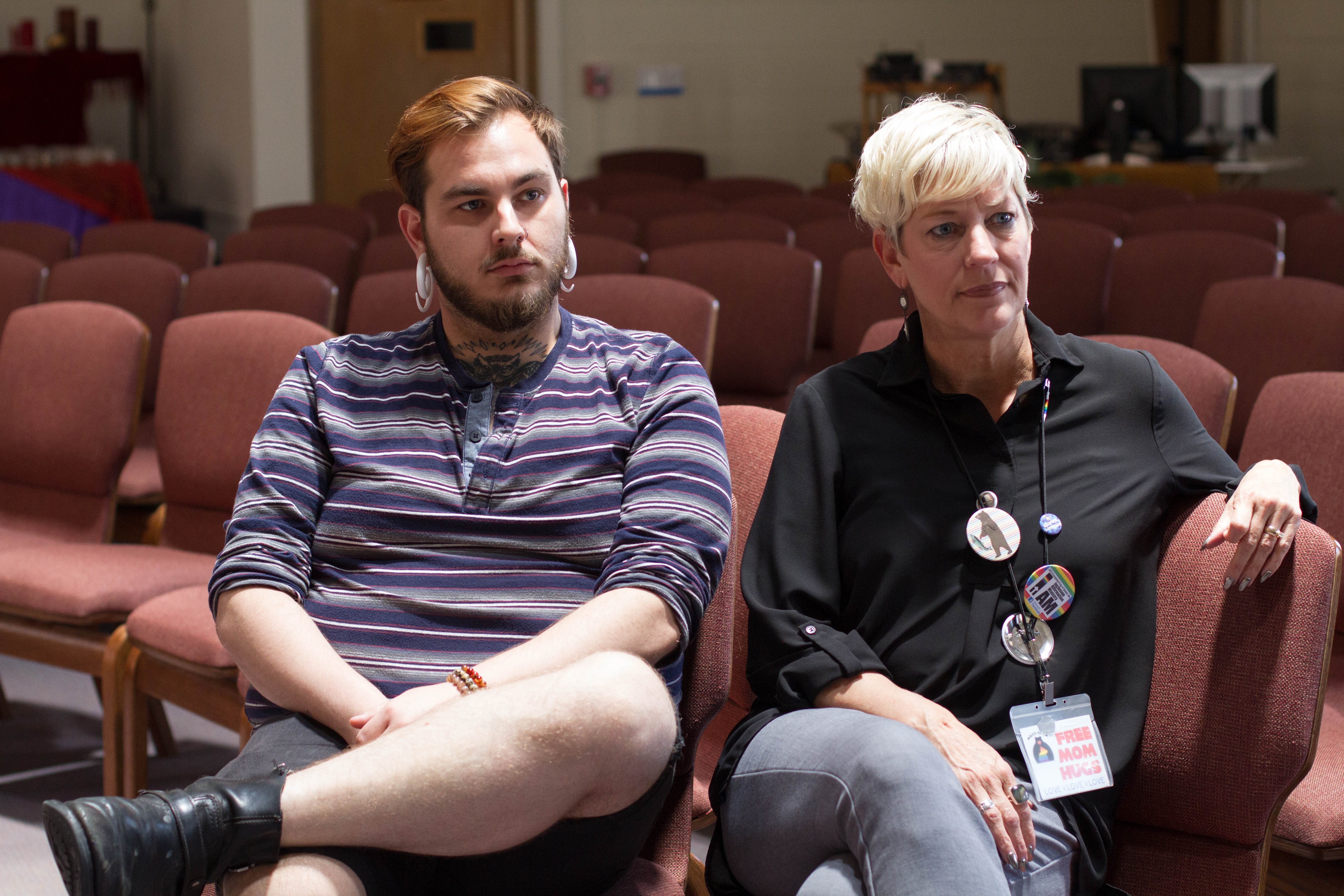
In the heart of the Bible Belt, Sundays are sacred.
Rooted in tradition, Oklahomans come together at churches for spirituality, fellowship, and guidance.
But for four women, advocates for the lesbian, gay, bisexual and transgender community, that tradition has them questioning their place and purpose in the church.
A mother approaches the pastor’s pulpit. She is adorned with the flair of small buttons with rainbow flags. A lanyard hangs around her neck with the phrase “Free Mom Hugs.”
Sara Cunningham speaks to the congregation about kindness, acceptance, and unconditional love. For Cunningham, the long journey to understanding what those words meant was difficult.
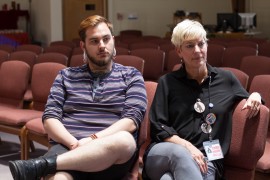
After her son Parker came out, her faith was tested in ways she would not have predicted.
“I’ve heard it said that when a gay child comes out of the closet, parents go into theirs,” Cunningham said.
A devout Christian in a conservative Baptist church, Cunningham found it difficult to reconcile her son’s sexuality with her religion.
The congregation of her church found it impossible.
“Why would you give your time and your tithe and your energy to a place where your child is not welcomed?” Cunningham said.
In her book, How We Sleep At Night, Cunningham explained how homosexuality was never explicitly talked about at her church. Any discussion of sexuality was confined to the realm of heterosexual abstinence and purity balls.
Eventually, Cunningham reached out to other members of the church for support, but soon faced a barrage of anti-gay cliches.
“‘Hate the sin, love the sinner.’ Sounds really good when you’re on the loving side of that equation,” Cunningham said. “But if you’re on the sinner side of that prayer, it feels dehumanizing and condescending.”
Cunningham came to terms and eventually accepted her son despite the pushback she received from her church.
Parker, her son, is one of the lucky ones.
Many gay teens do not find the acceptance that he found in his parents and face homelessness as a result. A study from the Williams Institute shows that 40 percent of homeless youth identify as LGBT.
The struggle of Parker and Sara Cunningham is not rare. Many Oklahomans face hardships when trying to reconcile the LGBT community and religion.
Outpatient Therapist Paula Sophia Schonauer has had her own battles with faith.
As a former deacon in the Episcopal Church, Schonauer didn’t start out wanting to be a public transgender activist.
Instead, she was outed by a news story.
“It thrust me into the public limelight,” Schonauer said.
Once the Associated Press published a story about the transgender deacon from Oklahoma, it didn’t take long before parishioners asked the church’s bishop to remove her from her post.
“I was ordered to renounce my Holy Orders in 2005,” Schonauer said. “After that, I ran out of steam as far as faith goes.”
Schonauer speaks about losing her faith and considering atheism for a few years before finding her way back to God in 2008.
Like Schonauer, Meghan Fife-Boswell was also asked to leave her church.
Her mother was the piano player and her father was a Sunday School teacher. For two years, she served as a youth leader in a Christian ministry in central Oklahoma.
When she was nineteen years old she had become involved with another female youth leader. Soon, members of her church found out about the relationship.
“We just kind of hit it off. We started spending a lot of time together,” Boswell said.
She said that eventually she was asked to leave the ministry with the intention of “getting better.” She spent time trying to seek truth through prayer, scriptures, and religious council.
“I actually went back to that same place. I told them that I was better,” Boswell said. “I was only there for two months before I met another girl.”
After that, Boswell left the youth group for good.
Despite being ostracized by her church, Boswell found acceptance from her parents.
“It might have taken them two to three years to fully come around. Over time, those who love their children are gonna find a way to reconcile that,” Boswell said.
For LGBT youth coordinator Kris Williams, that reconciliation with her parents didn’t come for 18 years.
A Texas native, Kris didn’t come out until she was attending Southern Nazarene University, some 500 miles away from her family.
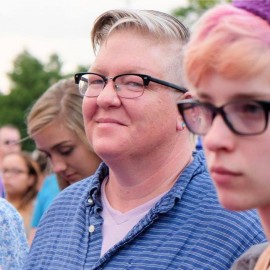
“I grew up in the church. I grew up in a community that ended up disowning me,” Williams said.
After being rejected from her church community, Williams sought acceptance from the LGBT community.
”What I found in our community were hurt people who hurt people,” she said.
Williams explained this is the nature of what happens to people when they are rejected by society. She says that for some in the LGBT community, this rejection created an atmosphere of toxicity, addiction, and suicide.
A Center for Disease Control and Prevention study shows that the suicide rate for LGBT youth is more than double when compared to their straight peers.
“Can you imagine all the wonderful people and how many leaders we have lost to suicide because we didn’t have a community to foster people in a healthy way?” Williams said.
When Williams decided to come out, she chose to isolate herself rather than face her family.
“The result was just as damaging,” she said.
For many years her parents refused to accept her. Since the death of her father, Williams said her mother has become more accepting and curious about her life.
Now, as an LGBT youth coordinator and mentor, Williams teaches kids that communication skills are important. She also tells kids that they shouldn’t be ashamed of who they are.
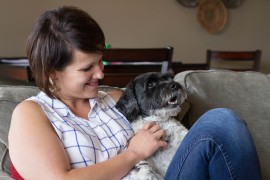
Sara Cunningham, Paula Sophia Schonauer, Meghan Fife-Boswell, and Kris Williams are not alone in their experiences with their church.
A Pew Research study found that 29 percent of LGBT individuals surveyed say they have been made to feel unwelcome in a place of worship.
In 2012, the Southern Baptist Convention issued a public statement on homosexuality and same-sex marriage. The statement, a resolution passed at the group’s national convention, points to scripture that describes all people as being created in the image of God and are all due respect and love.
However, the resolution also states that members of the LGBT community “do not present the distinguishing features of classes entitled to special protections, like the classes of race and gender” and that “homosexual rights activists have misappropriated the rhetoric of the Civil Rights Movement.”
The Southern Baptist Convention encourages its congregations to focus on “compassionate, redemptive ministry to those who struggle with homosexuality.”
The official Catholic stance on homosexuality, as published by the Vatican, describes it as a “grave depravity” and “intrinsically disordered.”
Under Catholic doctrine, homosexuality cannot be approved in any circumstance. Homosexuals are called by the Catholic church to practice chastity so they may one day “gradually and resolutely approach Christian perfection.”
However, the Protestant and Catholic doctrines deviate when it comes to civil rights and protections for LGBT members.
In Catholicism, LGBT members are to be treated with respect and compassion and “every sign of unjust discrimination in their regard should be avoided.”
On the eve of the Supreme Court’s ruling on same-sex marriage, a poll conducted by the Human Rights Council found that among American Catholics, there is overwhelming support for LGBT equality and non-discrimination laws.
The poll showed that 64 percent of Catholic voters supported marriage equality. When it came to providing basic employment protections, that number jumped to 83 percent.
Although the official doctrine of the Catholic church has not changed in regards to the LGBT community, Catholics are slowly beginning to make the shift towards more LGBT inclusivity and acceptance.
“I feel the shift [in the church] since Pope Francis touched on the subject of homosexuality,” said Jessica Ramirez, a Catholic youth minister from Texas. “His genuine heart has touched others and has reminded priests, deacons, and other religious leaders not to turn away our brothers and sisters, but to show them the love of God.”
Ramirez recognizes her own shift on homosexuality. She said she believes that God has humbled her in this area. “I may not completely be in agreeance with the lifestyle, but everyone is welcome into the house of God, including the LGBT community.”
Other Oklahoma City metro churches declined to speak on the issue. Several churches were contacted for this story but did not respond back to comment.
A spokesman for Life Church said the church “generally didn’t participate in political stories” so it can maintain its focus on “reaching people of all walks of life with the life-changing message of God’s love.”
Despite the official stance of many Christian denominations, studies show that attitudes toward homosexuality are changing.
The National Congregations Study, in a report funded by Pew Research, found that between 2006 and 2012, congregations allowing gay couples to claim full membership grew from 37 percent to 48 percent.
Openly gay and lesbian members allowed to assume leadership positions rose from 18 percent to 26 percent.
Not only is the religious community becoming more LGBT-friendly, there are churches that identify as gay-affirming.
One such church in the Oklahoma City metro is the Church of the Open Arms.
The Church of the Open Arms was founded in 1997 as a branch of the United Church of Christ. According to the church’s website, the UCC is the most progressive protestant denomination in the United States and has been gay affirming since 1969. In 1975, UCC ordained its first gay clergy member.
The church’s congregation is actively working to help heal the wounds of an embattled community. In addition to its commitment to justice and equality, church members work in conjunction with multiple outreach agencies; as well as operate a food pantry open to anyone in need.
“I understand that many have been hurt by churches, myself included,” said Kayla Bonewell, the church’s pastor. “Unfortunately, we expect the church to be unlike the rest of society; a place where everyone acts as Jesus lived and taught, and that doesn’t always happen. In the church and in the wider society, we sometimes mess up and cause pain.”
Bonewell explained how her church has developed a structure to include “Boundary Training” every three years as a way to create a safe, welcoming and positive environment for all members, including children.
Sara Cunningham, Parker’s mother, shared her story of the “Free Mom Hugs” campaign. She spoke of how she used a spiritually turbulent time to uplift others.
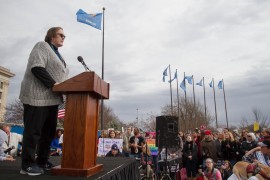
From her vision, the campaign has become a nationwide movement of Christian moms who seek to spread love one hug at a time throughout the LGBT community.
For Schonauer, her initial hesitancy to be a transgender advocate has evolved into being one of the most recognized faces in the Oklahoma City LGBT community. Her dedication to helping others in need led her to pursue a master’s degree in social work, where she uses her voice and life lessons to help other heal.
Meghan Fife-Boswell said she understands the struggles the LGBT community faces because of discrimination in purchasing a home. She now uses her background in real estate to assist the LGBT community in that endeavor.
This year she has had her most successful sales year yet, having closing on 53 homes.
Despite years of running from the condemnation of her own church and family, Kris Williams has found success as an advocate working with multiple LGBT outreach organizations.
Through her years of service to the community, she has helped countless youth find their own voice and truth through mentorship and loving support.
On the surface, these four women are different in many ways. What ties them together is their dedication to service and shared experiences with their churches. Each has transformed the pain of religious exile into something positive for a community in need.
For members of the clergy, such as Bonewell, the effort to welcome LGBT members into the faith community continues. “What our church tries to practice is to be in community with people who learn how to say ‘I’m sorry when we hurt each other,’” she said.